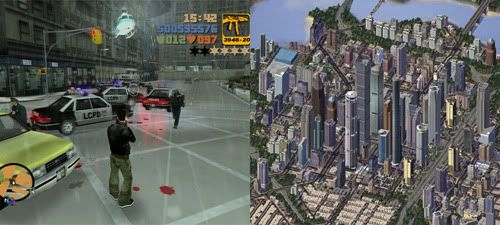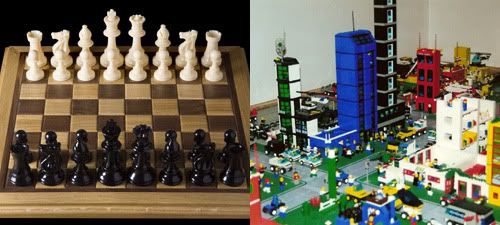There's a conventional wisdom among some game developers and enthusiasts that in order for the player to have fun, the fun way has to be the easiest way. That is, players don't care about how they're "supposed" to play the game if they can find an easier way of doing it, even if that easier way is boring, dull, repetitive, etc.--and they'll then get bored with the game quickly and blame the developer for having failed at making a fun game.
And there are certainly many players for whom this wisdom holds true. Those who played Left 4 Dead by simply hiding in a corner and meleeing their way through a horde of zombies (and thus prompted the melee fatigue patch), to name a recent example.
And there is nothing wrong with such players, at least in their playing style. (Blaming the developer when they don't enjoy the game seems a bit much, though.) For many such players, they wouldn't blame the developer because they aren't looking for a game to be "fun"; or rather, fun has a different meaning to them than other players. For them, it simply means accomplishment, overcoming the challenge presented by the game by any means possible. These are the compulsive gamers, who strive for every achievement, the highest level, the fastest solution, etc. (And those that don't complain are publishers' wet dreams: they consume games with very little regard for their quality.)
But I'm more interested in the games that could be said to actively defy this play style. That is, all such players will generally end up doing things in a game unintended by the developer (which is absolutely right and good, all players should) and more importantly things that make the game arguably less interesting, but there are some games where such players will miss the entire point of the game. Which brings me to the Hitman series.

Hitman's protagonist is a genetically-engineered super-assassin known as Forty-Seven. While fragile compared to some FPS protagonists, he's far stronger than any human or any enemy in the games: he can take a shotgun blast to the chest and keep on going. (Two, however, starts to push it, and there's no way of regaining health during a mission.) On most missions, Forty-Seven could easily get to his target by simply cutting down everyone with a gun. Enemies in Hitman are fragile: a bullet to the head is instant death, it only takes a few more shots to the chest with a pistol, and a heavy weapon buts down anyone with a single burst anywhere.
But the game's design is based around stealth. It's a game about sneaking in, knocking out a lone guard, taking his uniform, hiding his body, infiltrating a compound without rousing suspicion, silently assassinating the target, and then getting out before anyone is the wiser. It's a game in which an FPS-style massacre means you've screwed up. Yet there is little in-game penalty for such action, and it's certainly easier than the stealth approach. Unlike some stealth games--like the Thief series, where stealth is a requirement because almost any enemy will easily dispatch you in one-on-one combat, or the Splinter Cell series, where stealth is a requirement because you fail most missions if anyone "raises an alarm"--Hitman is perfectly content to allow you to complete a mission through mass murder.

from The Amateur
There are a few drawbacks--the later games rate your performance on each mission based on your stealthiness, with the highest rating offering some unlockable bonuses, and the first and fourth game, which allow you to purchase your own equipment, penalize you monetarily ("clean-up" expenses deducted from your payment). But by and large, you can ignore nearly every major mechanic of the game and simply shoot your way through if you want. The game will play like an extremely easy and short third-person shooter.
So why is Hitman one of the more well-regarded franchises on the PC, especially the fourth game, which garnered nearly universal praise? Because most players understand what's fun about the game. Because most players understand that survival is not the challenge in Hitman. Completing the mission is not the challenge in Hitman. Just because the game allows you to advance on those conditions alone, they are not victory.
Well, that's not exactly true, of course. As soon as you try to define "victory" or the "challenge" of a game as anything other than reaching the end screen, you're in subjective territory. (Not than anything is truly objective, but you get the idea, I hope.) But what we're talking about is just that--players defining their own victory conditions. Players deciding that merely advancing in the game is not good enough for them.
(As a side note, an interesting thought just occured to me that in essence, Hitman is a game that allows you to fail. Because the game is so easy in terms of simply finishing the missions, you don't see a game over screen or are otherwise forced to reload a saved game very often. Most of the time when you restart a mission or load a save, it's by your own choice--you failed your own conditions, not the game's, and you could have continued if you had wanted to. And that's a very interesting and powerful thing, to me, the option to fail and go on, though I won't be exploring it in this post.)
There are a couple things that are very interesting to me about this. The first is the meta aspect: because Forty-Seven can easily dispatch everyone in a given mission, the fact that he (canonically) doesn't and instead pursues stealthy execution means that he is, in some way, playing a game with his targets. Forty-Seven, unlike most shooter protagonists, isn't in this for survival. That's easy. He's in it for invisibility. He's in it about satisfying his own chosen conditions. He's playing a game, just like the players.
There's often a disconnect between the abilities of a player and the supposed abilities of a game's protagonist. Half-Life, for example, is often mocked for its MIT graduate lab assistant who manages to slaughter Marines and stop an alien invasion, while on the other side, many games with military protagonists are forced to treat players like ignorant civilians (like they are) rather than well-trained soldiers. Hitman, to me, is one of the few games that evades this problem. There are a few moments in cutscenes when the player may know more than Forty-Seven (he is ignorant of a lot of human culture due to his upbringing), but for the most part the story's treatment of the character matches up with players' abilities.

The second interesting thing to me is that by making the game's conditions of advancement easy to satisfy, it encourages players to make their own rules. I started this post talking about players who don't do what game developers intend them to--and I pointed out that, in general, this is a great thing and something all players should do and all developers should encourage. And this is what I meant.
The difference between the players I described at the start of this post and Hitman players isn't some slavish adherence to how the game is "supposed" to be played. That's a bullshit idea. Hitman doesn't have a "right" way to play it any more than any other game. The difference with Hitman players is that they aren't to make the game as easy as possible. They're out to make the game as challenging as possible. Players impose their own restrictions on themselves, set their own goals, and consider themselves defeated when they fail those goals, not when the game tells them they've been defeated.
One of the most important bits of game theory I've ever heard was from Will Wright, creator of Sim City. In a talk on stories in games, Wright commented than whenever he talked to someone who'd played Grand Theft Auto, for example, and asked about the game, he never heard anything about the game's linear narrative. Instead he heard stories about getting six stars, using rocket launchers to destroy tanks, crashing cars and creating massive pile-ups, and so on. And these, he explained, are all stories, too--and stories that are more important and more meaningful to players than the ones authored by game developers, because even if they aren't as detailed or as complex or as artistic or whatever, the players created them, not the developer, and that makes them more meaningful to them than anything someone who's never met them could create.

Wright is also famous for describing his own creations--Sim City, The Sims, etc.--as toys rather than games because they don't have set victory conditions.
I think there's an obvious correlation here. In Sim City, so long as the player doesn't go bankrupt, the game never ends. There is no "winning" Sim City. Thus players have to decide for themselves what they're aiming to accomplish, what kind of city they want to build. They define their own victory conditions. In Hitman, "winning" is easy, in the sense of actually reaching the end of the game. But it's that ease that allows players to play with the game. When advancement is trivial and the game's space is nonetheless diverse, players are allowed and encouraged to decide for themselves what they're aiming to accomplish, what kind of hitman they want to be. They define their own victory conditions. And they can change their minds, try out different techniques and goals, vent steam when they're frustrated by actually just slaughtering everyone, and so on.
What we're talking about is the difference between a game of chess and a Lego set. Chess is a very strictly defined game--all of your options are set from the beginning. There is a limited number of variables with limited possible values and a strict victory condition. Thus winning is simply a matter of calculation--that's why computers are the best chess players. There is such thing as the perfect chess algorithm, the perfect chess game, even if it hasn't been created yet.

A Lego set is just a child's toy rather than the province of grandmasters. Nobody sets computers on building the best Lego set. And you know why? Because they can't. Legos are building blocks for our own imagination. They're tools to aid us in developing our own creativity. They can teach problem solving just as much as chess can--we can define our own goals, our own victory conditions, and figure out the best way to solve them, or set a computer to do it for us. But those victory conditions must always be decided first by the player.
And, of course, chess was the same way once. Someone decided the victory conditions of chess, the rules of chess. And those rules changed over time, when people didn't just play the game but played with the game, toyed with it, experimented. It's just that at some point people decided not to anymore. That toying was wrong, that chess was only worthwhile if the rules were always the same, that accomplishment only had value when it could be compared numerically against someone else's accomplishment and one could be declared objectively (hah!) superior. When people decided that there had to be a best way to play chess.
In other words, what we're talking about is the difference between a game player and a game creator. The person who follows the rules and the person who makes the rules. The computer and the programmer.

Who do you want to be?



0 comments:
Post a Comment